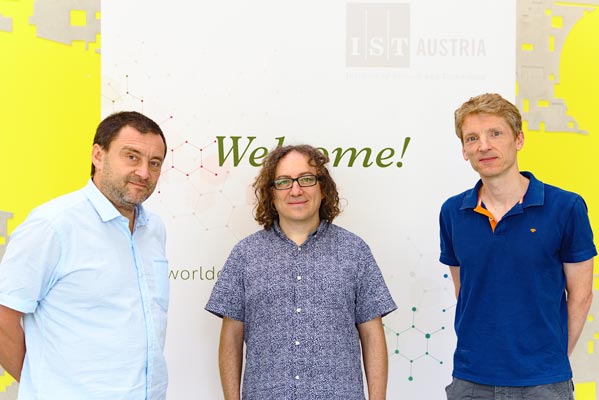July 8, 2021
Three IST Austria Professors join Academia Europaea
Mario de Bono, Vadim Kaloshin, Robert Seiringer become members of pan-European scientific society

© Thomas Zauner / IST Austria
The Academia Europaea is a pan-European, non-governmental scientific society. Its members are researchers from various scientific disciplines who wish to promote education and research worldwide. Now, IST Austria Professors Mario de Bono, Vadim Kaloshin, and Robert Seiringer enter this prestigious society. “It is quite an honor to be selected to join this prestigious society, and of course, it always feels good if a wider scientific community recognizes one’s achievements,” describes Robert Seiringer the good news. They join over 4,000 experts, including over 50 Nobel Prize winners and seven colleagues from IST Austria. Here, we introduce the Academia’s three newest members.
Genes, Circuits, and Behavior
Neurons are highly specialized cells, and many fundamental questions about their organization, function, and plasticity are still unaddressed. Mario de Bono dissects the evolutionarily conserved building blocks that govern the properties of neurons and circuits in worms called Caenorhabditis elegans. By complementing genetics with biochemistry, he gains insights into neurological processes and molecular mechanisms conserved from worms to humans.
The Rigidity of Sounds
In mathematics, rigidity means that an object cannot be ‘shaped’ into a different one. However, rigidity is not limited to geometrical shapes but can encompass various properties. Vadim Kaloshin explores the rigidity of sound. He investigates how the shape and sound of a drum connect. Is it possible to change the form of a drum without changing the sound? Vadim Kaloshin develops a mathematical theory showing that often one cannot deform a drum without deforming the sound.
Scaling Statistics from Microscopic to Macroscopic
The physical properties of a single particle vary enormously from an object made up of millions of particles. Thus, transitioning the statistical methods for microscopic systems to a macroscopic level remains a significant challenge. Therefore, Robert Seiringer develops new mathematical tools for the analysis of many-particle systems in quantum mechanics, with a particular focus on exotic phenomena in quantum gases. These new methods can lead to different points of view and thus increase our understanding of physical systems.



